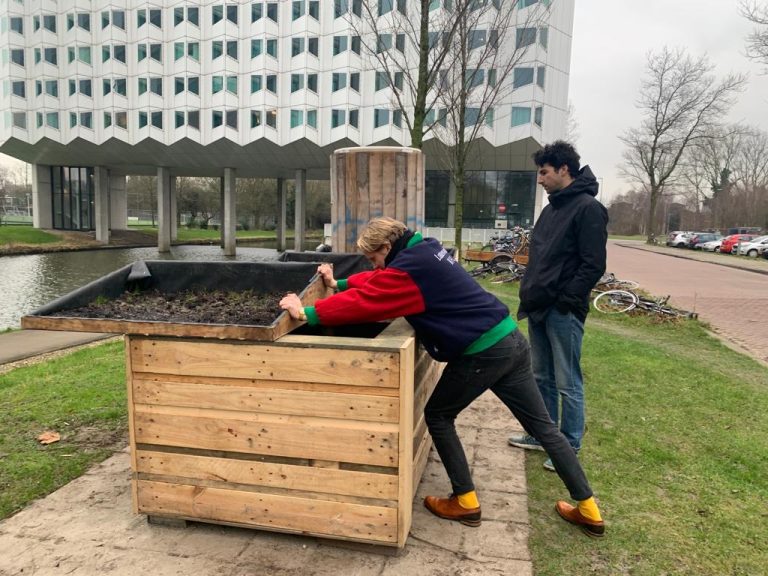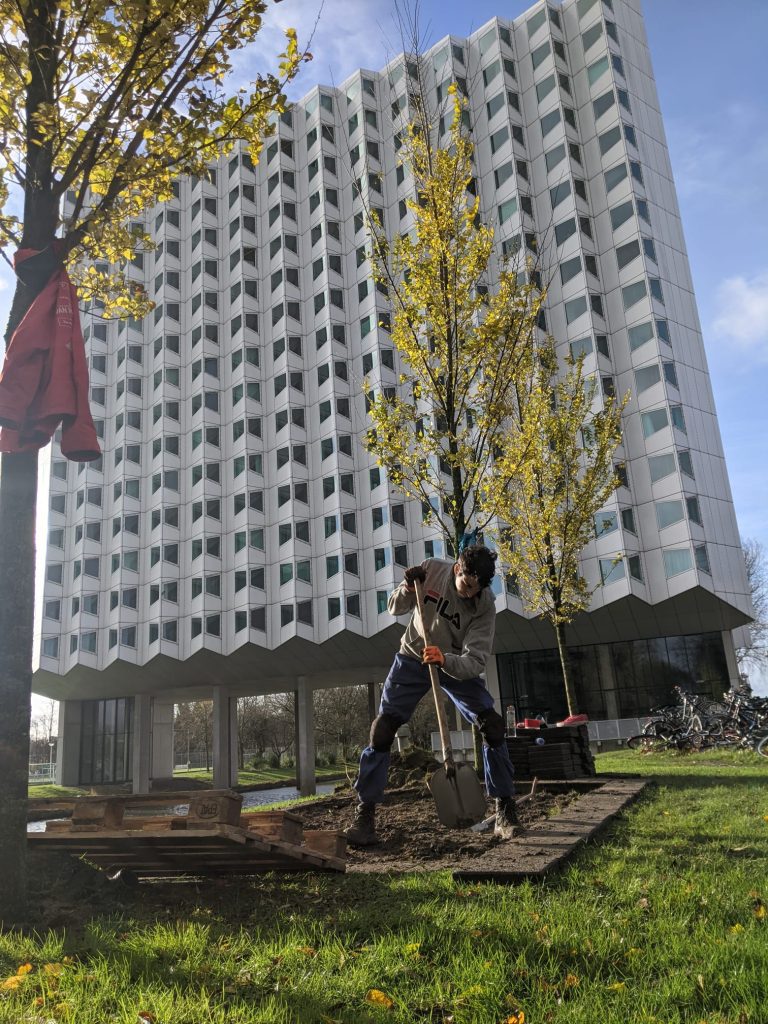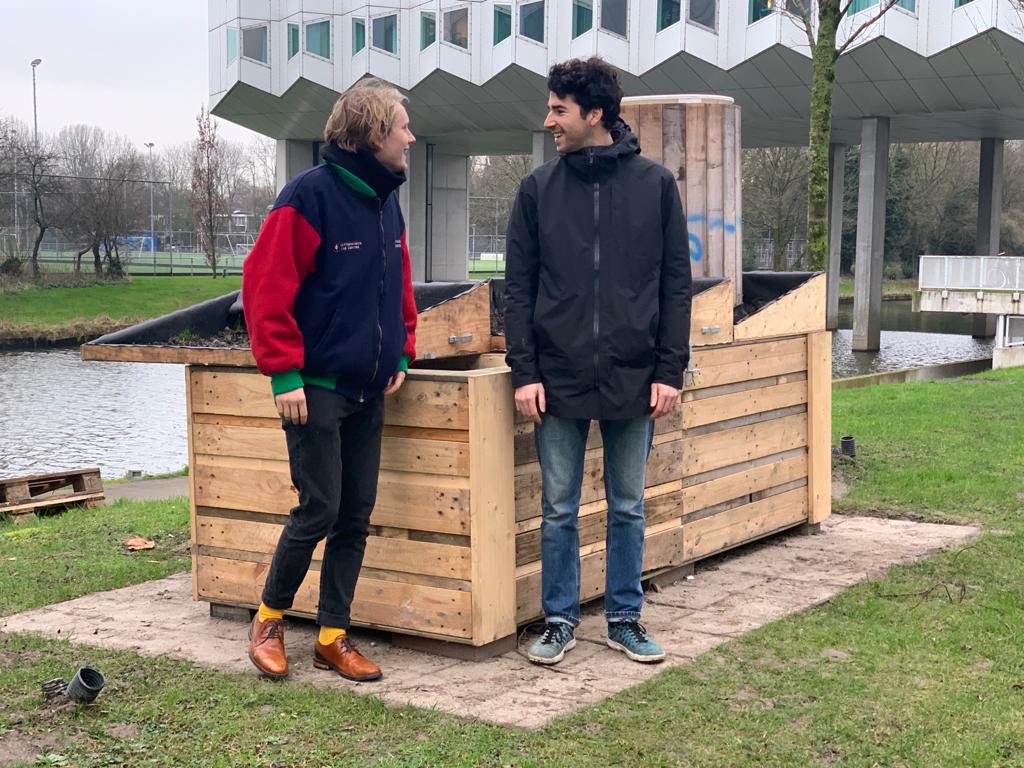You may have already seen it at the Balthasar van der Polweg: the Compost Factory. Students Timo and Mickey built it themselves from recycled wood and kilos of earth.
Timo Rodermond (right) and Mickey Linskens (left) designed the Compost Factory after a couple of evenings discussing. (Photo: Delta)
Master’s student Timo Rodermond steps onto the grass outside the flats on the Balthasar van der Polweg. “Look, this is it,” he says. He points to a wooden structure that resembles an old fashioned factory. It reaches to his torso. Rodermond puts his hands on top of the structure and pushes the ‘factory roof’ open. Inside is a pile of vegetable peels, fruit and straw. Ready to be digested by the hundreds of worms that now call this place their home.
The Compost Factory as Rodermond and his fellow builder Mickey Linskens have baptised their home-made compost container, has been in use for the last couple of months. A handful of students put their vegetable and garden waste in it and the worms greedily convert their waste into soil. The users are still a select group. Linskens explains that “We are keeping the number of students that may use the Compost Factory small on purpose to see how quickly the worms digest the waste and what the optimal amount is. Once we know that, more students can sign up.”
Rodermond, who is studying Maritime Engineering, came up with the idea of a compost container when he walked past a worm hotel one-and-a-half years ago on campus. Just like a lot of people, he had more time than usual because of the corona crisis. “I googled and looked at all sorts of YouTube films to find out about what worms do and what you can do with them.” It would be wonderful to do something useful with the worms yourself. Rodermond phoned Linskens and after a couple of evenings of beer drinking, thinking and drawing on beer mats, the design was ready. “We wanted something that would look nice,” says Linskens, who is working on a master’s in Industrial Design. “The shape of the factory – the polluting, deafening, smoke emitting factory as they had in Manchester in the 1970s – is a nod to the sustainable character of this project.” After collecting about 50 signatures, they got the cooperation of the Municipality of Delft and of Duwo. The student accommodation company owns the ground on which the Compost Factory stands and lent it to them.
Apart from the locks to close the container and the pond liner, the factory full of hard workers is completely made from recycled material. The factory’s exterior is made from pallet wood that they bought with money from the Delft Municipality Fund. And for the factory chimney they used an old cable reel that they attached with old bicycle valves. The kilos of earth in the interior of the structure make the worms feels at home and come from under the factory floor. “We needed to dig out a bit of earth to secure the Compost Factory properly.”
Stichting Stunt
The students built the Compost Factory in three days – with a lot of help from the employees of Stichting Stunt. “On the third day we used a forklift truck to bring all the factory parts from Stichting Stunt’s workshop to the field along the Balthasar van der Polweg.” Installing the factory took a lot of effort. “It took a lot longer than we thought,” says Rodermond. “It was winter so it kept getting darker and darker but at the last minute we managed to get hold of a power unit so that we could have some light.” They then encountered another problem: the campus security who wondered what the students were getting up to in the middle of the night on a grass field next to the campus. “This piece of land is owned by Duwo,” says Rodermond pointing at the ground. “A couple of metres further on it is TU Delft property so it can be expected that the security people came to check. We explained that we had permission from Duwo, but the security guards still needed to go through some security procedures.”

One of the most complicated pieces of the puzzle was ensuring a suitable interior climate for the worms. “If we want workers to work hard, they need to feel at home,” says Linskens. “At first it was really complicated, but as soon as we understood that we needed to reproduce the underground climate, we understood exactly what we needed to do. We lined the interior walls with earth and made sure the factory had the right temperature and moisture level.”
 The students have been given the land on loan from Duwo. (Photo: Private collection)
The students have been given the land on loan from Duwo. (Photo: Private collection) If it were up to the two of them, the Compost Factory would get lots of brothers and sisters all round Delft in the years to come. “Throwing away fruit and vegetables sustainably is already quite complicated. And certainly for students as there are a lot of us, there are few containers for organic waste and the waste starts smelling quickly,” explains Linskens. “Now the soil that is produced means that you get something useful back.”
The two students are still not done with talking, drawing and thinking about this first example. “We want to put reeds with plumes into the chimney so that it looks like the Compost Factory is emitting smoke,” says Linskens. “And maybe the users can plant their own plants on the roof,” adds Rodermond. “That would be amazing.”
Do you have a question or comment about this article?
a.m.debruijn@tudelft.nl


Comments are closed.